US & Canada Versions: 209. Geordie
[Despite it's rarity, there have been dozens of versions collected in North America. I currently have 58 versions in my collection, with three multiples (Kentucky/Niles/Roberts; Davis C and D-- also two of the Russell version which is Davis AA/REC) and one family version that is almost identical (Mehrten- Cowell versions, 1952). Bronson prints 22 versions with tunes, which is not a complete list of tunes. My collection is not complete since there are a few versions missing that are listed below the Contents list.
Usually the titles are Georgie, Geordie, Georgia (usually still pronounced Georgie to rhyme), the life of Georgie or Charlie. The earliest US version, titled "Georgey," comes from Eunice Carew's collection of forty-three secular songs dated 1790-1792 found in the John Hay Library, Providence, RI. (Reprinted in Contentment, or, The compleat Nutmeg-State songster - Page 93; Jim Douglas 1987).
There are several versions from Maritime Canada (4 Creighton NS, 1 Greenleaf NL) and one other from Canada (Fowke, ON- NB) and four from New England. Here's the earliest US version:
Georgey- c. 1790 (excerpt from Eunice Carew's collection of forty-three secular songs dated 1790-1792 found in the John Hay Library, Providence, RI)
Come saddle to me your milk white steed,
And bridle him so neatly,
That I may away to my Good Lord Judge,
And Plead for the life of Georgey.
As I walk'd over London Bridge;
'Twas in the morning early
'Twas there I met with this Good Lady
Pleading for the Life of Georgey.
The inclusion of this ballad in the 1823 Green Mountain Songster also likely takes the date back before 1800 since it was compiled by a Revolutionary War veteran.
Charley’s Escape (first verse and second combined)- Green Mountain Songster, 1823
1. As I walk’d over London bridge, twas on one morning early,
‘Twas there I spied a gay lady lamenting for her Charley;
Come saddle to me my milk white steed, come bridle to me so early,
That I may go down to my good lord Judge, and plead for the life of Charley.
Many of the US versions, like Charley's Escape above, are related in part or wholly to the second broadside ballad in Child's Appendix to Geordie:
"The Life and Death of George of Oxford. To a pleasant tune, called Poor Georgy." Roxburghe Collection, IV, 53, Pepys, II, 150, Jersey, I, 86, Huth, I, 150, according to Mr. J. W. Ebsworth, Roxburghe Ballads, VII, 70, 1890. It was printed for P. Brooksby, whose time Mr. Ebsworth gives as between 1671 and 1692. Here's the first verse:
1 As I went over London Bridge,
All in a misty morning,
There did I see one weep and mourn,
Lamenting for her Georgy.
This opening verse is not present in Child's versions A-L. It's also found in other similar British broadsides printed over one hundred years later:
The Life of Georgey Printed between 1849 and 1862 by H. Such, 123, Union Street, Borough. Printer's Series: (80). Harding B 11(1797)
Death of Georgy Printed between 1820 and 1824 for W. Armstrong of Liverpool. Harding B 25(488)
Maid's lamentation for her Georgy Printed between 1819 and 1844 by Pitts, Wholesale Toy and Marble Warehouse, 6, St Andrew Street, Seven Dials [London] Harding B 11(2297)
Maiden's Lamentation for her Georgy Printed between 1828 and 1829 by T. Birt, 10, Great St. Andrew Street Seven Dials, London. Harding B 16(137b)
The Maid’s Lamentation for the Loss of Her Georgy printed by Jennings of London c.1809-1815, was also printed later in the century by Such of London. The last stanza is influenced by ‘The Unquiet Grave’.
The first recording [Listen: Georgie by Stikeleather 1925] appears to have been made by Gordon (cyl. A101, Item NC146) of Nancy Weaver Stikeleather in Asheville, North Carolina on November 11, 1925 which was "learned from a mountaineer." Stikeleather's version is well documented and was published at least three other times. I played with Doc Watson a few times and got to know him well, he passed away last year. Here is Doc's version [Listen: Georgie- Doc Watson] a ballad which he learned the tune from his father-in-law fiddler Gaither Carlton. Doc said he learned some of the words from (Cecil) Sharp's book but none of Sharp's versions are that close to what he sings. His version is close to Vance Randolph's D version from Georgia Dunaway, Fayetteville, Arkansas, Jan 30, 1942 but it's more likely Doc got his text from another local source.
The same version as Niles version from Virginia first published as "Geordie" in Shirmer's Songs of the Hill-Folk in 1934 then again in his Ballad Book under the title "The Death of Geordie," is reported also from the Pine Mountain Settlement School in KY by Roberts, who says ballad dates back to circa 1913 where it was sung in a songbooks there (title "Ballads," it's not in the main book, Song Ballads & Other Songs of the Pine Mountain Settlement School- 1923). How Niles found it in Virginia is unknown- it's possible he got it from Pettit at Pine Mountain Settlement School or his informant learned it from someone who learned it there. Many of the Virginia versions from both Davis (John Stone) and the 1936 recording from "Sam" Russell are very similar to Niles version. We may never know the true origin!
Two Virgina versions, Davis C (a compilation including D) and D collected by John Stone in 1921 have been combined- see Davis C for both.
There are three versions at the Max Hunter Folk Song Collection at Missouri State; two are very similar both textually and melodically, and represent the "Midwest version" with the weeping willow last verse. Hunter's informant Rhonda Hayes, originally from Bentonville, Arkansas has a version similar to the one collected by Parler in 1954 and Hunter's other informant O'Bryant from Kansas. Hunter's Missouri version by Strayer is a cover of Doc Watson and is not included for that reason.
The point of origin in North America is varied. Some versions arrived in Maritime Canada and these are similar to the broadside, George of Oxford (see details above). The New England versions are rare, Barry and Linscott finding none. The two early manuscript versions from the late 1700s (Carew; Green Mountain) are similar to the broadside as is Flanders A (Richards, NH).
The main point of origin is the Virginia colony where the ballad spread to NC, WV, and though rare to KY then points westward where it was found in MO, AR, and OK. Coffin has four story types and in his D type which is very rare (two versions; the Gordon/Scarborough of 1925 and Randolph C) Georgie goes free (this is similar to the purer Scottish versions of Child A-E).
R. Matteson 2013, 2016]
CONTENTS: (Individual versions attached to this page -in green- on left hand column- click to open. Or click on highlighted blue title below.)
1) Georgey- Carew (CT) c.1790 Douglas -- From Eunice Carew's collection of forty-three secular songs dated 1790-1792 found in the John Hay Library, Providence, RI. Carew also compiled three manuscript hymnals. Rerpinted in Contentment, or, The compleat Nutmeg-State songster - Page 93; by Jim Douglas, 1987.
2) Charley’s Escape- (VT) pre1823 Green Mt Songster -- From: Flanders, Ancient Ballads, III, 1963; version B. As taken from The Green Mountain Songster, which was compiled by a Revolutionary War veteran from Sandusky, VT, dated 1823-- which probably dates back to the 1700s.
3) Georgia- Larkin (IL) 1868 Musick JOAFL -- From The Old Album of William A. Larkin published by Ruth Ann Musick in The Journal of American Folklore, Vol. 60, No. 237 (Jul. - Sep., 1947), pp. 201-251.
4) The Life of Georgia- Ashby (MO) c.1870 Belden A -- Taken from James Ashby's MS book compiled shortly after the Civil War. It was sent to Belden in 1906. It was published by H. M. Belden in The Journal of American Folklore, Vol. 20, No. 79 (Oct. - Dec., 1907), pp. 319-320 under the title, Old-Country Ballads in Missouri, "Geordie".
5) George E. Wedlock- Dusenbury (AR) 1875 Randolph C -- From Randolph; Ozark Folksongs, 1946 Volume I. Emma Dusenbury of Mena, AR supplied Randolph this version in 1930 which she learned about 1875.
6) Georgie- Jencks (MI) c. 1876 Gardner
7) Georgie- Chandler (OK) 1896 Moore
8) Georgie- Dunaway (AR) c 1897 Randolph D
9) Go Saddle Me- Wormser (MO) 1909 Belden B
10) Georgia- Shibley (MO) 1911 Belden C
Charlie Condemned- Williams (KY) 1911 Thomas
Geordie- (NE) pre1915 Pound BK
Charlie (Geordie)- Wells (NC) 1916 Sharp A
Charlie (Geordie)- Gentry (NC) 1916 Sharp B
Charlie (Geordie)- Buckner (NC) 1916 Sharp C
Georgie- McAtee (WV) pre1917 Richardson-Cox
Go Saddle Up- McAtee (WV) 1918 JOAFL
Georgie (Geordie)- Donald (VA) 1918 Sharp D
Georgie (Geordie)- Bowyer (VA) 1918 Sharp E
Georgie (Geordie)- Boone (NC) 1918 Sharp F
Charlie and Sallie- Elliott (PA) 1919 Shoemaker
Georgie- Sigmund (AR) c.1920 Parler A
Georgie- McNeill (NC) c.1921 Brown 38(4)
Georgie- Hart (VA) 1921 Davis A
Geordie- Mulleins (VA) 1921 Davis C
Geordie- Sawyer (VA) 1921 Stone/Davis D
Johnny Wedlock- Tillett (NC) 1924 Chappell
Georgie- Stikeleather (NC) 1925 Gordon
The Life of Georgie- Underwood (MO) 1928 Rand A
Lovely Georgie- Simmonds (NL) 1930 Greenleaf
Georgie- Waddell (MO) 1930 Randolph B
London's Bridge- Russell (VA) Davis 1932
The Death of Geordie- (VA) 1932 Niles
Georgie (Geordie)- McAllister (VA) 1935 Wilkinson
As I Walked Over London's Bridge- Russell VA 1936
Georgie- Devlin (NJ) c.1938 Lomax REC; BK
Georgia- York (NC) 1939 Brown Collection
Geordie- Webb (NC) pre1940 Brown Collection
The Life of Georgie- Richards (NH) 1942 Flanders
Georgie- Grover (ME) pre1944 Wells; REC Lomax
Geordie- Bray (NS) pre1950 Creighton A
Geordie- Dodson (NS) pre1950 Creighton B
Geordie- Kennedy (NS) pre1950 Creighton C
Georgie- Dunaway (AR) 1951 Parler C
Georgie- Mehrten (CA) 1952 Cowell
Georgie- Mehrten, Dorothy (CA) 1952 Cowell
Geordie- Hatt (NS) 1952 Fowkes BK
Georgie- Skaggs (AR) 1954 Parler B
Georgie- Gaunt (RI) c.1954 Leach
Geordie- Hackler (KY) pre1957 Roberts
Geordie- Pease (WV-MA) pre1957 Musick
Georgie- O'Bryant (KS) c.1959 Hunter B
Georgie- McAllister (VA) 1959 Clayton and Foss
The Hanging of Georgie- Joines (NC) pre1968 REC
Georgie- Hayes (TX) 1969 Hunter A
Georgie- Watson (NC) pre1970 Rinzler
Georgie- Shinn (WV) pre1970 Bush Vol. 2
Georgie and Sally- Ayers (WV) pre1975 Gainer
----------------------
Missing versions
Charlie- Yankee Songster's Pocket companion (Gardiner ME 1824)
Acie Cargill & The Stone in Shoes Band Geordie (unsure if this is a family version from Hattie Mae Tyler Cargill)
Geordie
Paul Clayton, British Broadside Ballads in Popular Tradition, Folkways FW 8708, 1957
My Geordie shall be hanged in a golden chain
That's a chain of many
He stole sixteen of the king's wild deers
And he sold them in Bohenny
He stole sixteen of the king's wild deers
And he sold them in Bohenny
One city named Bohenie is near Pitlochry. Scotland.
Orem Mountain Songster, 33
Hummel, Oz F-S
Georgie- Crooked Road CD Series- Gin Burris: This song (Child 209) has variants reaching back to the 1600s, possibly even earlier. The earliest documented Virginia version was collected in Bedford County by the prolific song collector Cecil J. Sharp, in 1918. This song came to Gin through her mother’s family. “I’ve kind of put it a little more upbeat, a little jazzier than the original way.” Note Joey Burris’ wonderful guitar work. In many American versions of the song, the condemned’s name is changed to “Georgie.” Gin Burris – vocal Joey Burris – Guitar
Georgie- Source Helen Creighton collection (Nova Scotia Archives) AR 5057 / AC 2229 / 281; Performer Mrs. Nina Bartley Finn (also collector and pro singer) Canada : Nova Scotia : Dartmouth; Collector Creighton, Helen [This is likely someone else's version with Finn singing]
Geordie- Performer Jean Ritchie, Kentucky; Alan Lomax Sound Collection T1015.06 Collector Alan Lomax also: Mary Elizabeth Barnicle-Tillman Cadle Collection (Archives of Appalachia, E. Tenn. State Univ.) Disc BC-385;
Collector Barnicle, Mary Elizabeth
Geordie- Source Mary Elizabeth Barnicle-Tillman Cadle Collection (Archives of Appalachia, E. Tenn. State Univ.) Disc BC-557 Unidentified female; Collector Cadle, Tillman [This is probably Jean Ritchie (a second recording)
Geordie (see Roberts for same version) Song Ballads & Other Songs of the Pine Mountain Settlement School (1923) pp.118-119. [Geordie is not in the 1923 edition, the pages don't go to 118-119. It is in a booklet titled "Ballads."]
Georgie and Jennie- Edith Fowke Coll. (FO 64); Performer Bill Thatcher, Grand Rapids Michigan; Collector Edith Fowke.
Georgie Source Brewster: Southern Folklore Quarterly (1941) pp.170-171; Performer Mrs. Dora Ward, Princeton, Indiana; Collector Paul G. Brewster, 2nd Source: Library of Congress AAFS recording 1743 A3
Charlie- Source Robert W. Gordon Collection (American Folklife Center, LOC) Cylinder A176 item NC 260; Agnes Pressley N. Carolina; Collector Gordon, Robert W.
-----------------------
38. Geordie (Child 209) Brown Collection of NC Folklore
For the question of the origin of this ballad and its currency, see Child's headnote and BSM 76, adding to the references there given North Carolina (FSRA 37), the Ozarks (OFS I 161-5), Indiana (SFLQ V 170-1), Illinois (JAFL LX 245-6), and Michigan (BSSM 317). Our collection has but one full text, and part of a text as sung by Miss Hattie McNeill of Ferguson, Wilkes county, probably in 1922.
No title given. Sent in by James York of Olin, Iredell county, in August 1939.
1 As I went over London's bridge
So early in the morning,
And there I spied a pretty fair maid
Lamenting over Georgia.
2 'Go bridle now my mild [1] white steed
And saddle him so gaily
That I may ride to Oxford court
And plead for the life of Georgia.'
3 When she arrived at Oxford court
So early in the morning,
And down upon her bended knees
A-pleading for the life of Georgia.
4 He has not robbed no king's highway
Nor took the life of any,
But he stold fifteen of the milk-white steeds
And conveyed them away to Ghelenay.[3]
5 The king looked over her shoulder
And looked as if he was sorry
And said: 'Kind miss, you've come too late,
For Georgia's condemned tomorrow.'
6 He walked the streets both up and down
And took the leave of many.
But he took the leave of his own true love,
Which hurt him the worst of any.
7 Georgia was hung with a white silken cord,
And hung where there were many,
Because he was of noble blood
And loved by the royal lady.
1. During a visit at their home, June 17, 1956, Mr. and Mrs. York asked the present editor to make the corrections in the text as given below:
1. As I crossed over London's bridge
So early in the morning,
'Twas there I spied a pretty fair maid
Lamenting o'er her lover.
3 When she got to the Oxford Court
So early in the morning.
And down upon her bended knees
She pled for the life of Georgie.
4 He has not robbed the king's highway
Nor took the life of any,
But he stold fifteen of the queen's best steeds
And conveyed them away to Ghelenay.
7 Georgie was hanged with a white silk cord
And hung where there were many.
Because he was of noble blood
And loved by the royal lady.
2. So in the typescript; clearly a miswriting for "milk."
3. Just what country — if any — the singer had in mind is not apparent. Bohemia is the name used most often in other texts; Child G has Balleny.
-----------------------------------------
38. Geordie (Child 209) [Music from Vol. IV]
'Georgie.' Sung by Mrs. James York. No date or place given, but probably the same as next version. Mrs. York said that this was her mother's version, with the title 'Georgie.'[1]

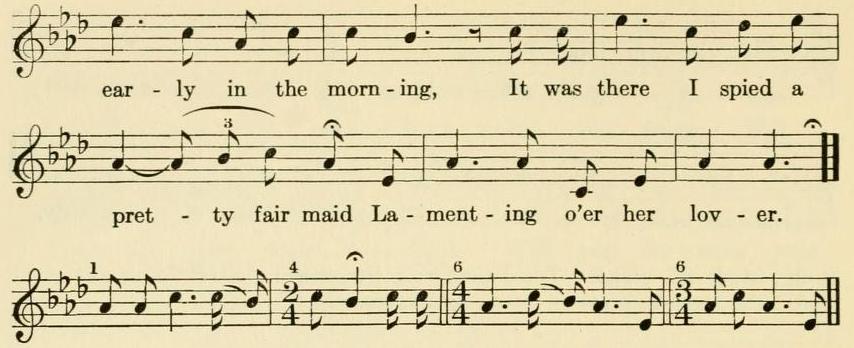
For melodic relationship cf. *SharpK I 240, No. 34A, measures 1-2 and merely some points of melodic coincidence ; also
SFSEA, 226, No. 229, measures 1-4. Scale: Pentachordal, plagal. Tonal Center: a-flat. Structure: abb1c (2,2,2,2) = ab (4.4)- The varied use of tonal material of measures 1-2 in the last three measures is interesting.
38 (I) 'Geordie.' (2nd tune.) Sung by Mrs. James York. Recorded at Olin, Iredell county, August 14, 1939. This is given by the singer as Mrs. York's father's version. Dr. Brown says: "Mrs. York's 'Little Mohee' air." [1] In contrast to the second version by Miss Pearle Webb, 38(3) below, this can justifiably be called a second version.
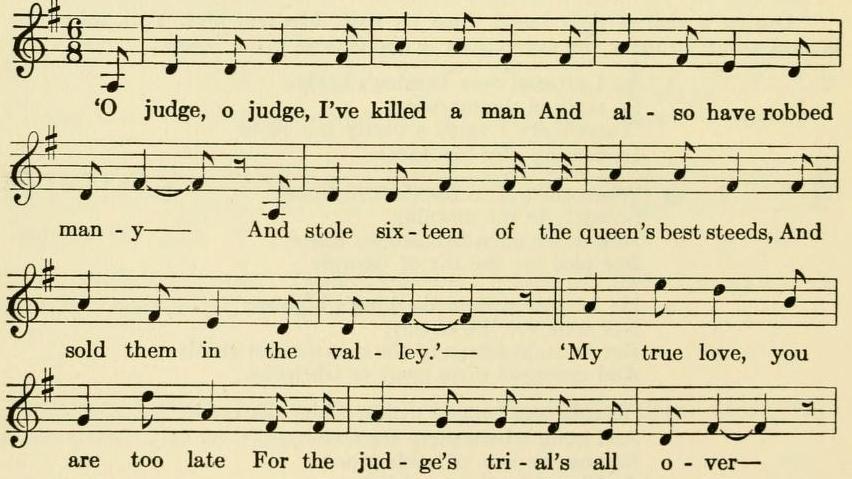

2 The youngest judge well he spoke up,
Says Georgie, 'I'm sorry for you.
But unless you confess to what you've done
You'll be hung for murder.'
4 Oh judge, oh judge, I've killed a man
And also have robbed many.
I stole sixteen of the queen's best steeds
And sold them in the valley.
Refrain :
'My pretty Miss, you are too late,
For Georgie's trial's all over.
My pretty Miss, you are too late,
For Georgie's trial's all over,'
For melodic relationship cf. *SFSEA 226, No. 229, measures 1-2.
Scale : Hexachordal, plagal. Tonal Center: d. Structure: ababca1ca1 (2,2,2,2, 2,2,2,2) = aabb (4,4,4,4). Circular Tune (III).
38(2) 'Geordie.' Sung by Miss Pearle Webb. From the previous recording of Dr. W. A. Abrams at Boone, August 8, 1940. There is a resemblance with some 'Barbara Allen' versions.
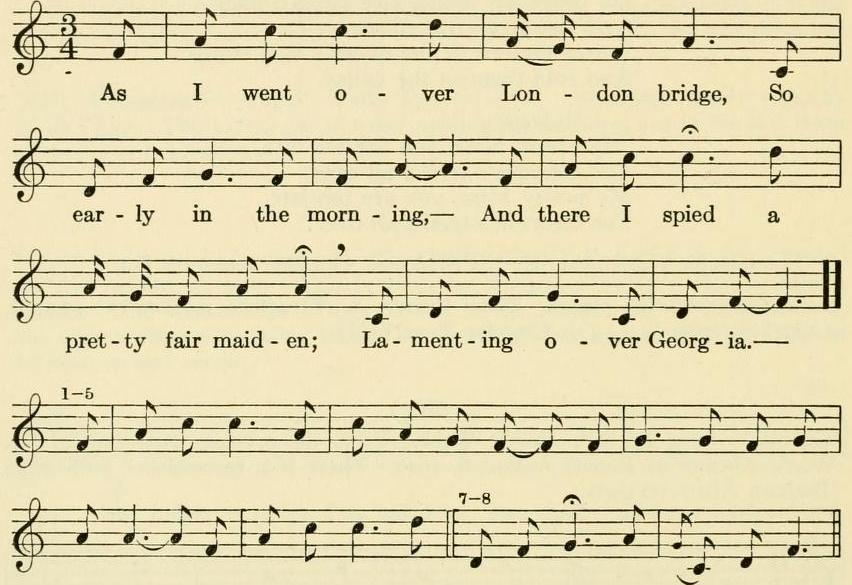
Scale: Mode III, plagal. Tonal Center: f. Structure: abac (2,2,2,2) 1= aa1 (4,4).
38(3) 'Geordie.' (2nd version) Sung by Miss Pearle Webb. From the previous recording of Dr. W. A. Abrams, Boone, August 8, 1940. If all the variations occurring in the six stanzas are considered, it will be found that only one measure of the first version, the seventh, does not occur in the second version. This takes somewhat away from the importance usually attached to a second version. There is, however, an interesting rhythmic shift in the fifth stanza as given for measures 6-7. The tune for the first stanza serves without change for the second and third. [text is missing]
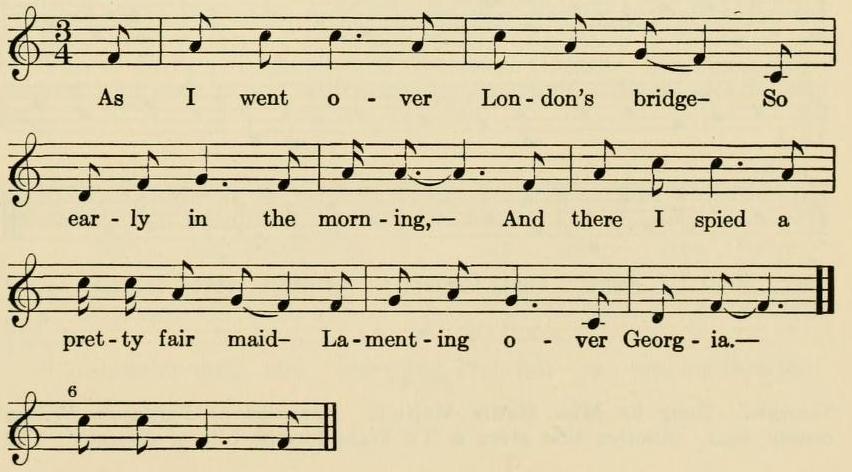
Scale: Mode III, plagal. Tonal Center: f. Structure: abab1 (2,2,2,2) = aa1 (4,4).
38(4) 'Georgie.' Sung by Miss Hattie McNeill. Recorded at Ferguson, Wilkes county, 1921. Another title given is 'I'd Fight for the Life of Georgie.' The MS score has no more of the text, and the words of the recording cannot be recovered.
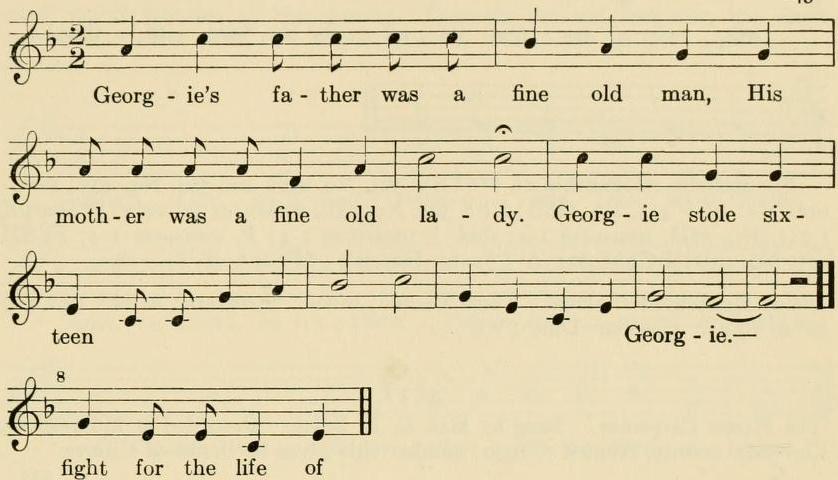
Scale: Hexatonic (6), plagal. Tonal Center: f. Structure: abcbi (2,2,3,3) = ab (4,6). The ending of both phrases is related.
Footnote:
1. On a recent visit to the home of Mr. and Mrs. York, the present editor was informed that this was not correct. The additional stanza was obtained at that time.
-----------------------
GEORDIE- internet transcription- may not be accurate- from Peggy Seeger Blood and Roses Vol. 3; US version; apparently based on the Arkansas version collected by Parler in 1954
As I walked over old London's Bridge
It was in the morning early
There I espied a pretty fair maid
Lamenting for her Geordie
She said "now saddle me my black,
go bridle him right gaily,
and I will ride this live long night
and beg for the life of Geordie."
She rode, she rode until she came there
It was in the morning early
And on bended knee she fell
Saying "spare the life of Geordie."
Then she pulled out her purse of gold
crying "Lawyers money aplenty!
Just fee yourself and think on me
and plea for the life of Geordie."
Then Geordie's lawyer he rose up
saying "I've nothing at all against him
By his own confession he must die
and the Lord have mercy on him."
The Judge looked over his left shoulder,
and he looked both sad and sorry,
"My pretty fair maid you have come too late
Geordie's going to be hanged tomorrow."
Geordie he walked up and down the hall
bidding adieu to many
but when he came to his own true love
it grieved him worse than any.
Geordie was hanged with a golden chain
such chains you don't see many
he was born of a noble race
and he loved a virtuous lady.
Geordie is buried in Harlan state
and over him grows a willow
with a marble slab at his head and feet
and his true love's arm for a pillow.
------------------
Geordie (Child 209) Baez (adapted from British and US versions)
... Em ......... D .......... C ......... G .. Em
As I walked out over London Bridge
................... G......... D
One misty morning early
Em .... D
I overheard a fair pretty maid
C ......... Em .... B7....... Em
Was lamenting for her Geordie.
Ah, my Geordie will be hanged in a golden chain,
‘Tis not the chain of many.
He was born of king’s royal breed
And lost to a virtuous lady.
Go bridle me my milk white steed.
Go bridle me my pony.
I will ride to London’s court
To plead for the life of Geordie.
Ah, my Geordie never stole nor cow nor calf,
He never hurted any.
Stole sixteen of the king’s royal deer
And he sold them in Bohenny.
Two pretty babies have I born.
The third lies in my body.
I’d freely part with them every one
If you’d spare the life of Geordie.
The judge looked over his left shoulder.
He said, “Fair maid, I’m sorry.”
He said, “Fair maid, you must be gone,
For I cannot pardon Geordie.”
Ah, my Geordie will be hanged in a golden chain.
‘Tis not the chain of many.
Stole sixteen of the king’s royal deer
And he sold them in Bohenny.
-----------------------
Excerpt from The British Traditional Ballad in North America
by Tristram Coffin 1950, from the section A Critical Biographical Study of the Traditional Ballads of North America
209. GEORDIE
Texts: Barry, Brit Bids Me, 475 (trace) / Belden, Mo F-S, 76 / Brown Coll / Chappell, F-S Rnke Alb, 37 / Cox, F-S South, 135 / Davis, Trd Bid Va, 435 / Flanders, Vt F-S Bids, 241 / Gardner and Chickering, Bids Sgs So Mich, 317 / Greenleaf and Mansfield, Bids Sea Sgs Newfdld, 40 / Green Mountain Songster, 33 / Hummel, Oz F-S / JAFL, XX, 319; XXXII, 504 / Niles, SgsHillFlk, 12 / Pound, Nebr Syllabus, n / Randolph, OzF-S, I, 161 / Randolph, Oz MtFlk, 2Z4/ Scarborough, Sgctchr SoMts, 213 / SharpC, EngF-S So Aplchns, #28 / SharpK, EngF-S So Aplchns, I, 240 / Shoemaker, Mt Mnstly, 162 / Shoemaker, No Pa Mnstly, 158 /
SFLO, V, 170 / Va FLS Bull, #s 7, 9 / Wetmore and Bartholomew, Mt Sgs NC, 13.
Local Titles: Charlie and Sally, Charley's Escape, Geordie, Georgia, George E. Wedlock, Georgie, Georgy-O, Go Saddle Up My Milk-White Steed, Johnny Wedlock, Lovely Georgie, The Laird of Gigh, The Life of Georgia.
Story Types: A: A man crossing London Bridge sees a girl weeping for Georgie. Georgie, in prison for a crime calling for capital punishment, has sent for his sweetheart or wife. She has hurried to him and knows that he can be rescued by a large ransom. She raises the money. However, Georgie in denying one capital offense admits another and is sentenced to death. He is hung. The girl often expresses the wish that she were armed so that she might fight for him.
Examples: Belden (A); Davis (A); Randolph, OzF-S (D).
B: The same general story is told in this type. However, in some texts, upon her arrival at the prison the lady is offered aid by an old man. At any rate, the king or judge says she has come too late and that Geordie is already condemned for horse or deer stealing. Geordie is hung in silk robes (or similar suitable style) because he is of royal blood and loved by a virtuous
lady. The wish of the girl that she had weapons with which to fight for her lover is sometimes found in this type too.
Examples: Cox, Greenleaf and Mansfield.
C: The story is the same as that of Type A. However, it is told differently, and the ransom and the girl's pleas are successful so that Charlie and his Sally go free.
Examples: Flanders; Shoemaker, Mt Mnstly.
D: This type of story rises from the traditional British texts in which Geordie is freed by his wife (true love). Geordie is in trouble. He sends a man to tell his lady of his plight. She hurries to the King and produces enough money to free her man.
Examples: Randolph, OzF-S (C); Scarborough.
Discussion: Because of the existence of the Scottish traditional song, Geordie, and two not dissimilar broadsides Georgie Stools (early seventeenth century) and The Life and Death of George of Oxford (late seventeenth or early eighteenth century), this ballad presents a definite scholarly problem. (See Child, IV, 1237, 1402.) The chances are that the two broadsides re-
present literary reworkings and contemporary adaptions of the old Scottish song. (See Cox, F-S South, 135.) However, Ebsworth, Roxburghe Ballads, VII, 67 73 thought the opposite to be the case.
Although the ransom motif is generally vague or lacking and the crime charged may be murder, as well as stealing the king's cattle, the Type A-C American texts derive from George of Oxford and the variant British broadsides. See Child, IV, 124 and 127, and JAFL, XX, 319. In the broadsides, the hero is hung in the end, although the girl's pleas are successful in the traditional texts as well as in the Green Mountain Songster version (Type C). Barry (see a letter quoted by Henry, F-S So Hghlds, 142 ff.) discusses this point in connection with the derivative songs such as the Henry The Judge and the Jury, op. cit., 142.
The Type A-C American texts are difficult to classify. The Type A and Type B stories are certainly from the same broadside tradition, having many stanzas in common. However, in a narrative sense, they do fall into two classes, if only because of the material retained or forgotten in each group. Both these types contain stanzas that have not been traced to either the known broadsides or the traditional texts in Child. Type C, although it shares much material with Types A and B, seems to have an ancestor with a sentimentalized close.
Type D texts are localized variants of the traditional form of the song, even though they seem to have passed unrecognized as such. Randolph, Oz F-S, C parallels Child F rather closely through its first seven stanzas and summarizes the story of Child F in the last four stanzas. Of course, Child F is not a pure example of the traditional form of the song, its first and second stanzas having been corrupted by the Oxford broadside, but it does tell the traditional tale. Randolph's variant has an Oxford first stanza like Child F, but from there on shows no relation to any form but the traditional. However, certain localizations and repetitive features have clouded the identity to some degree. The Scarborough text (See Wetmore and Bartholomew, Mt
Sgs NC, 13 for a very similar text taken from the same informant) is abbreviated, but obviously related to the Randolph song. See SFLQ, XIII, 161-168.
Chappell, F-S Rnke Alb, 37 prints a fragment called Johnny Wedlock (the Randolph text has the title George E. Wedlock). However, it is too brief to be clearly identified.